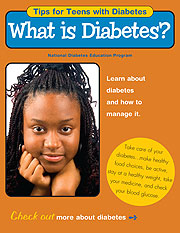 |
||||
Tips for Teens with DiabetesWhat is Diabetes?Print version (PDF* 782kb) |
|||
|
See our other Teen Tip Sheets |
|||
Learn about diabetes and how to manage it.
Check out more about diabetesTake Care of Your Diabetes!What is diabetes?
An organ called the pancreas (PAN-kree-as) makes insulin (IN-suh-lin). Insulin helps glucose get from your blood into your cells. Cells take the glucose and turn it into energy. If you have diabetes, the pancreas makes little or no insulin or your cells cannot use insulin very well. Glucose builds up in your blood and cannot get into your cells. If your blood glucose stays too high, it can damage many parts of the body such as the heart, eyes, kidneys, and nerves. Are there different types of diabetes?Yes. There are three main types of diabetes. In type 1 diabetes, the cells in the pancreas that make insulin are destroyed. If you have type 1 diabetes, you need to get insulin from shots or a pump everyday. Most teens can learn to adjust the amount of insulin they take according to their physical activity and eating patterns. This makes it easier to manage your diabetes when you have a busy schedule. Type 1 used to be called “insulin dependent” or “juvenile” diabetes.
Gestational (jes-TAY-shon-al) diabetes is a type of diabetes that occurs when women are pregnant. Having it raises their risk for getting diabetes, mostly type 2, for the rest of their lives. It also raises their child’s risk for being overweight and for getting type 2 diabetes. Why do teens get diabetes?
Being overweight increases the risk for type 2 diabetes. Teens who make unhealthy food choices, are not physically active, or who have a family member with diabetes are more likely to get type 2 diabetes. Some racial groups have a greater chance of getting diabetes—American Indians, Alaska Natives, African Americans, Hispanics/Latinos, Asian Americans, and Pacific Islanders. It is not true that eating too much sugar causes diabetes. What do I need to do to take care of my diabetes?
Your doctor will tell you what blood glucose level is right for you. Your goal is to keep your blood glucose as close to this level as you can. Your doctor or diabetes educator will teach you how to check your blood glucose with a glucose meter. It helps to know what affects your blood glucose level. Food, illness, and stress raise your blood glucose. Insulin or pills and being physically active lower your blood glucose. Talk with your doctor or diabetes educator about how these things change your blood glucose levels and how you can make changes in your diabetes plan. Carbohydrates (CAR-boh-HY-drates), or carbs for short, are a good source of energy for our bodies.But if you eat too many carbs at one time, your blood glucose can get too high. Many foods contain carbs. Great carb choices include whole grain foods, nonfat or low-fat milk, and fresh fruits and vegetables. Eat more of them rather than white bread, whole milk, sweetened fruit drinks, regular soda, potato chips, sweets, and desserts. Why do I need to take care of my diabetes?
The good news is that when you take care of your diabetes, you can reduce or avoid these problems. Do not let diabetes stop you! You can do all the things your friends do and live a long and healthy life.
The key to taking care of your diabetes is to keep your blood glucose as close to normal as possible.
Learn more! Check out…National Diabetes Education Program to get free copies of other tip sheets for teens
www.YourDiabetesInfo.org • 1-888-693-NDEP American Association of Diabetes Educators to
find a diabetes educator near you American Diabetes Association for help to manage
diabetes American Dietetic Association to find a dietitian
near you Bam! Body and Mind website for help to stay healthy Children With Diabetes website for more about kids
and families with diabetes Juvenile Diabetes Research Foundation
International for help to manage diabetes National Diabetes Information Clearinghouse for
more about diabetes WIN – Weight-control Information Network for weight control help:
www.win.niddk.nih.gov/publications/take_charge.htm
*PDF files require the free Adobe Acrobat Reader application for viewing. All our publications are copyright-free. Please duplicate and distribute as many copies of these materials as desired. Attention visually impaired visitors: To use common screen reading programs with PDF documents, please visit access.adobe.com, which provides a set of free tools that convert PDF documents to simple HTML or ASCII text. |
|||
NDEP
Home | About
Diabetes | Resources
for Health, Education, and Business Professionals DHHS
Home | NIH
Home | NIDDK
Home | CDC
Home |
|||

Includes information about managing the ABCs of Diabetes. Also features information for people with diabetes who are eligible for Medicare benefits.
Learn how to prevent or delay type 2 diabetes through small steps.

 Diabetes means that your blood glucose (GLOO-kos), also called blood
sugar, is too high. Glucose comes from the food you eat and is needed to
fuel our bodies. Glucose is also stored in our liver and muscles. Your
blood always has some glucose in it because your body needs glucose for
energy. But having too much glucose in your blood is not healthy.
Diabetes means that your blood glucose (GLOO-kos), also called blood
sugar, is too high. Glucose comes from the food you eat and is needed to
fuel our bodies. Glucose is also stored in our liver and muscles. Your
blood always has some glucose in it because your body needs glucose for
energy. But having too much glucose in your blood is not healthy. In type 2 diabetes, the
pancreas still makes some insulin
but cells cannot use it very well.
If you have type 2 diabetes, you
may need to take insulin or pills
to help your body’s supply of
insulin work better. Type 2 used to
be called “adult onset diabetes.”
Now more teens are getting type 2, especially if they
are overweight.
In type 2 diabetes, the
pancreas still makes some insulin
but cells cannot use it very well.
If you have type 2 diabetes, you
may need to take insulin or pills
to help your body’s supply of
insulin work better. Type 2 used to
be called “adult onset diabetes.”
Now more teens are getting type 2, especially if they
are overweight. Both genes and things like viruses and toxins
may cause a person to get type 1 diabetes.
Studies are being done to identify the causes of
type 1 diabetes and to stop the process that
destroys the pancreas. Researchers can now
predict who is at risk for developing type 1
diabetes and in the future may be able to
prevent or delay the onset of the disease.
Both genes and things like viruses and toxins
may cause a person to get type 1 diabetes.
Studies are being done to identify the causes of
type 1 diabetes and to stop the process that
destroys the pancreas. Researchers can now
predict who is at risk for developing type 1
diabetes and in the future may be able to
prevent or delay the onset of the disease. The key to taking care of your diabetes is to keep your blood glucose as close to normal as possible. The best way to do this is to:
The key to taking care of your diabetes is to keep your blood glucose as close to normal as possible. The best way to do this is to: If you take care of your diabetes you can lower your
risk for other health problems. High blood glucose
can harm blood vessels and cause heart attacks or
strokes. It can also damage organs in the body and
cause blindness, kidney failure, loss of toes or feet,
gum problems, or loss of teeth.
If you take care of your diabetes you can lower your
risk for other health problems. High blood glucose
can harm blood vessels and cause heart attacks or
strokes. It can also damage organs in the body and
cause blindness, kidney failure, loss of toes or feet,
gum problems, or loss of teeth.






